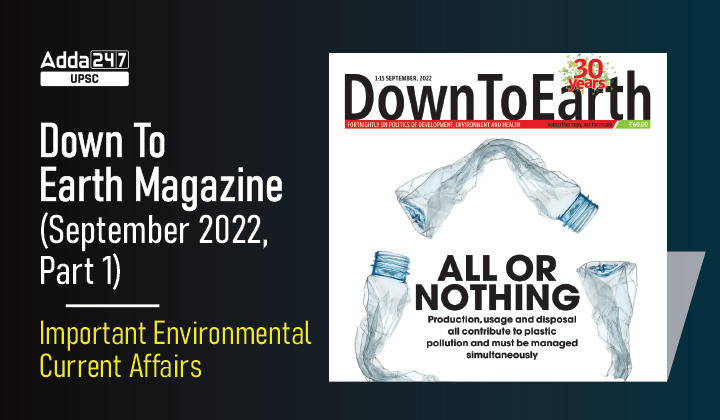Table of Contents
Down To Earth Magazine is a fortnightly magazine focusing on politics of environment and development, published in New Delhi, India.
UPSC Previous years’ questions on Development, Environment, Health and Disaster Management give us a clear idea about the increased importance of Down To Earth Magazine.
Down To Earth Magazine is one of the most important and indispensable sources for UPSC Civil Services Exam Preparation.
Keeping this in mind, here, we come with ”Gist Of Down To Earth Magazine” which covers important environmental current affairs articles in smooth pointed form, keeping in mind the demand of UPSC aspirants.
Katchal island
Why in news?
Katchal island has lost more than 90 per cent of its mangrove cover over two decades, US space agency NASA revealed through satellite images on August 8.
Key points about Katchal island
- The island in the Nicobar archipelago was severely hit by the 2004 tsunami over the Indian Ocean, after which the land subsided by 3 m and submerged many mangrove ecosystems, NASA’s Earth Observatory noted.
- Originally known as Tihunya, the Katchalis in the ancient times werecalled Payus and the island was ruled by Queen Changa.
- Queen Changa was a devout Hindu who had built a temple in Katchal. Later she embraced Christianity. Although 90 per cent of the people in Katchal are Christians, the tribals in Katchal maintain their own traditional lifestyle.
- Coconuts, pigs, rituals and festivals arewhat their life is all about.
Parboiled Rice
Why in news?
- The Union government on August 11 agreed to procure 0.8 million tonnes of parboiled rice from Telangana, amid low paddy acreage across the country this kharif season.
- Earlier this year, the Centre had refused to buy parboiled rice from the state due to huge stocks with the Food Corporation of India, leading to protests from growers and political leaders in the state, a major producer of this variety, and the national capital.
What is parboiled rice?
- The dictionary meaning of ‘parboil’ is ‘partly cooked by boiling’.
- Parboiling of rice is not a new practice, and has been followed in India since ancient times. However, there is no specific definition of parboiled rice of the Food Corporation of India or the Food Ministry.
- Today, there are several processes for parboiling rice. For example, the Central Food Technological Research Institute (CFTRI), Mysuru, uses a method in which the paddy is soaked in hot water for three hours, in contrast to the more common method in which paddy is soaked for 8 hours.
- The Paddy Processing Research Centre (PPRC), Thanjavur follows a method known as the chromate soaking process. It uses chromate, a family of salt in which the anion contains both chromium and oxygen, which removes the odour from the wet rice.
COVID-19: A Workplace Risk
What does this classification mean?
- Recognition of covid-19 as a workplace or occupational disease acknowledges the fact that workers in certain professions, such as healthcare and sanitation, are at greater risk of contracting the infection.
- Countries consider occupational diseases when drafting labour laws. Identifying which sectors are prone to certain illnesses help leaders draft specific regulations to prevent them, and provide financial and social support to workers.
Do countries officially recognise covid-19 as an occupational disease?
- Since the start of the pandemic, several countries including Australia, China, Canada and France have made the classification.
- On August 15 this year, trade unions in the UK urged the government to do the same.
- The World Health Organization and the International Labour Organization say that both covid-19 and long covid—lingering health effects after the infection recedes—should be seen as occupational diseases.
- In India, however, experts say that such a measure is unlikely to come soon, given that several sectors depend on informal workers.



 TSPSC Group 1 Question Paper 2024, Downl...
TSPSC Group 1 Question Paper 2024, Downl...
 TSPSC Group 1 Answer key 2024 Out, Downl...
TSPSC Group 1 Answer key 2024 Out, Downl...
 UPSC Prelims 2024 Question Paper, Downlo...
UPSC Prelims 2024 Question Paper, Downlo...




